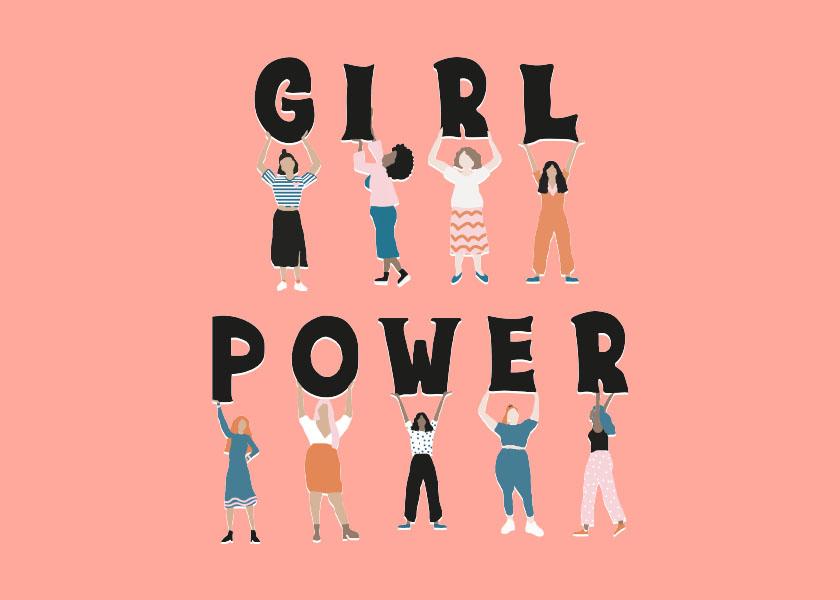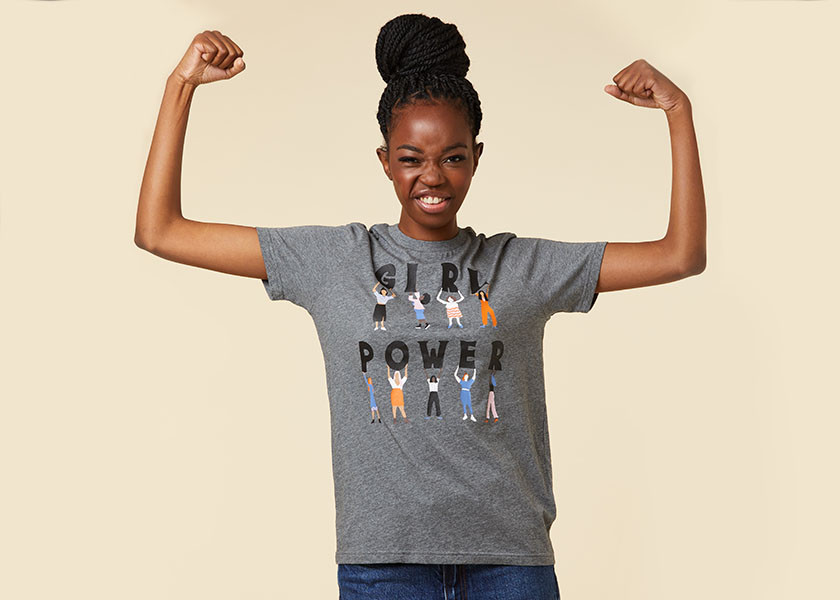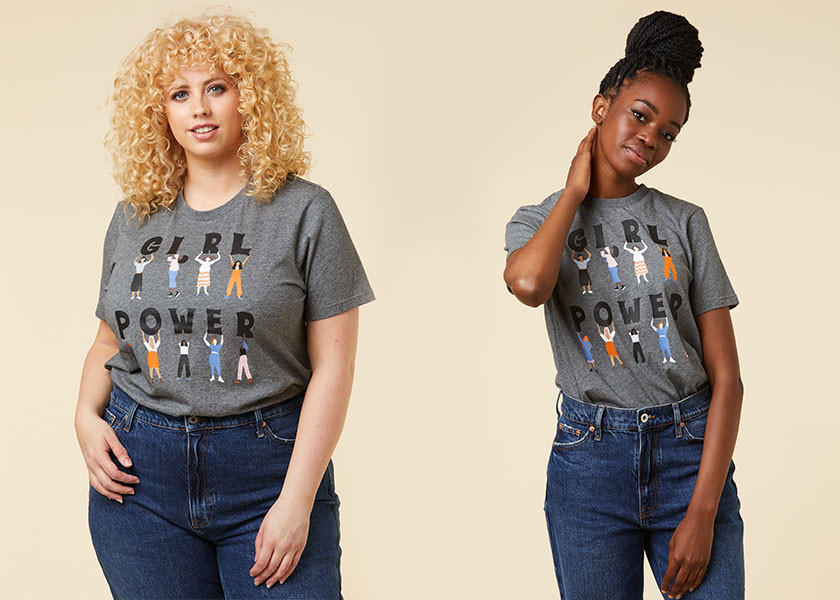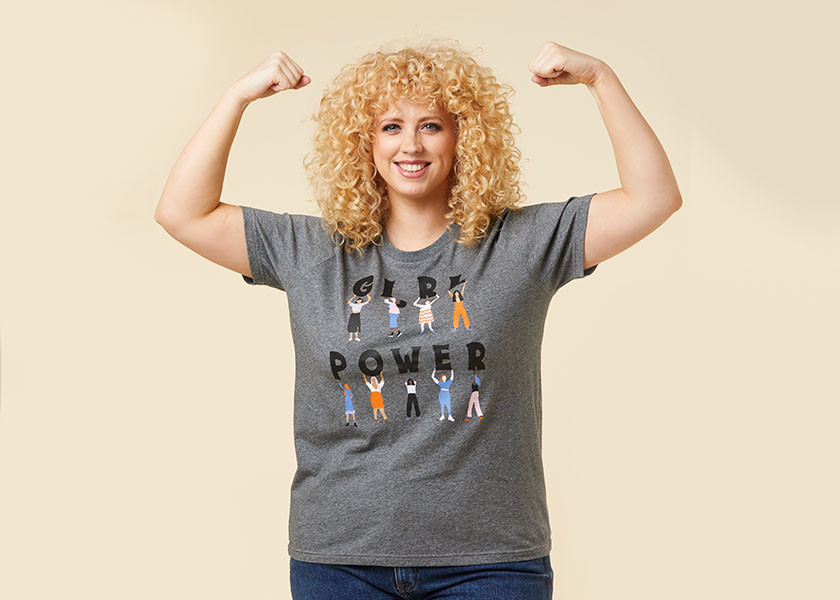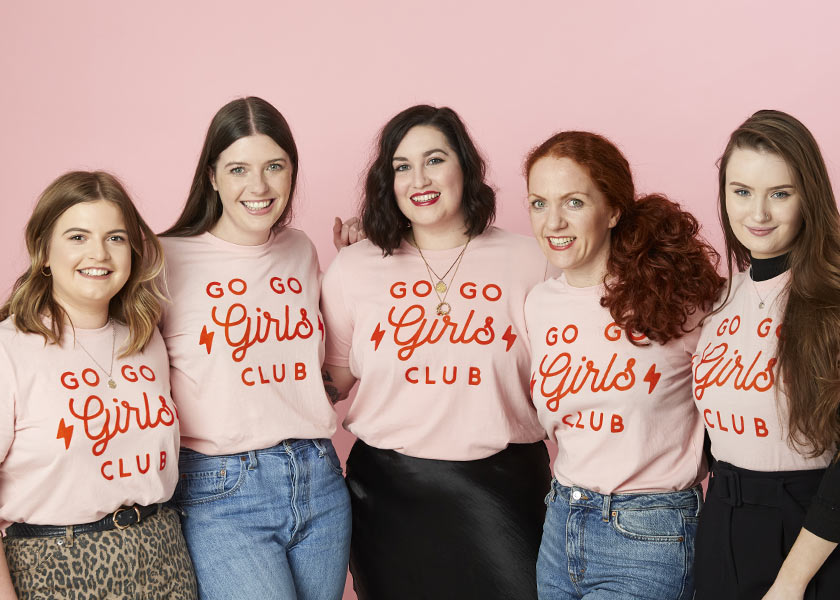We’re thrilled to once again be collaborating with The Girls’ Network – a wonderful award-winning charity that works with girls from disadvantaged communities and provides them with a female mentor to open new opportunities and networks that they otherwise would not have access to. Our Gloria ‘Girl Power’ Slogan Tee is available now, with £5 from each sale being donated to the charity.
We caught up with Rebecca Stevens, Greater Manchester Region Manager for The Girls’ Network, to learn more about the charity and the work they do.
Rebecca’s role involves working with schools to develop mentoring programmes, enrolling and training new mentors and growing the network by recruiting more schools to work with.
Take it away, Rebecca!
For anyone who isn’t aware of the Girls’ Network, could you share a little about the ethos and main motivations behind the charity?
The Girls’ Network aims to inspire and empower girls aged 14-19 from the least advantaged communities by connecting them to a mentor and a network of professional role models who are women.
We were founded by two teachers who saw first-hand the multiple barriers facing the least advantaged girls in their classrooms: the pressure to conform to ideals, a lack of confidence or self-belief, and a lack of professional female role models in their networks. The importance of role models is really evident anecdotally but also through research demonstrating that it’s hard to become someone or something without examples of people like you doing it. Research shows that speaking directly to professionals in certain jobs is one of the biggest influencers in challenging your own stereotypes on what you can and can’t do. So diverse role models are key: people you can relate to by gender, ethnicity, sexuality, career choices, background. This is particularly important for young people.
Can you tell us how The Girls’ Network started, and how long the charity has been running for now?
It began in 2013, when Charly Young and Becca Dean were teachers at a secondary school in North West London and they identified the barriers faced by the young women they taught. They established a 1:1 mentoring programme for 30 girls based on research showing that conversations and personal relationships could have a big impact on challenging stereotypes and expectations.
We’re thrilled to be supporting the Girls’ Network once again, with £5 from every T-shirt sold being donated - what resources or initiatives in the charity will this money help to support?
Firstly, thank you so much to Joanie Clothing for supporting us with this donation. The T-shirts are fabulous (and super soft and comfortable!).
The donations will support the work we do by enabling us to train our wonderful volunteer mentors, support our work with schools and enable us to reach more girls who will benefit from the support and guidance of a professional woman.
How long have you been a part of the Girls’ Network and how did you get into this line of work?
I’ve been at The Girls’ Network for a year now and absolutely love working here. My background is quite varied - I did my BA degree in History, followed by a Masters in Arts Management. I worked in the arts sector for a couple of years before doing Teach First and getting experience as a Primary school teacher before moving to the charity sector. Throughout all of this experience I became more and more aware of the barriers that face women and girls in all areas of life and I have experienced discrimination and sexism first-hand. Being in a role that directly challenges these things is so rewarding.
How has the charity grown and developed since the early days?
From those early days working with a few schools in London, The Girls’ Network has grown to support girls across England. We now work with schools across Sussex, Portsmouth, London, the West Midlands, Manchester, Liverpool, Warrington, the Tees Valley and the North East.
Do you believe it’s important for the girls to have someone to look up to and be inspired by? Who was your biggest female role model growing up and why?
I think it is hugely important for all girls to have strong female role models to look up to. That’s why we run our mentoring programme - it is an amazing way for a professional woman to share her experience and skills with a girl that might not benefit from this support otherwise. It is also a great way to show a teenage girl that someone believes in her, and that she is worth investing time in. This is a powerful combination, and one that we have seen transform the lives of girls and young women again and again.
I had some wonderful teachers growing up who believed in me and championed me. The time they took to support me is still appreciated and remembered on probably a weekly basis.
Are there any exciting plans coming up in the pipeline you could share with us?
In Manchester we are a fast-growing region and hope to make a difference to the lives of girls in every Greater Manchester borough over the next 5 years.
Nationally, our aim is to grow our reach from 1% to 25% of girls from the least advantaged communities across England (and the UK) by 2030. We want to grow The Girls’ Network so we can help at least a quarter of the 163,000 teenage girls in this country who are eligible for free school meals. Our biggest goal is for them to believe that they can achieve and not feel held back by their circumstances or gender.
The pandemic has had a huge impact on schools and education - how has this affected the charity being able run and stay in contact with the girls?
The Girls’ Network has continued to operate, react and adapt to the impact that the pandemic had on our work with schools. In March 2020, we decided that mentoring had to continue, which meant changing the sessions from being face-to-face to taking place online. We’ve worked with schools to make sure the girls continue to be supported by their mentors, whether via Zoom, Google Meets or Microsoft Teams. We’ve learned that online mentoring is possible, and can be really valuable, having seen some significant impact from online mentoring sessions. We’ve considered it an opportunity to support young people during a challenging, testing time, and we’re grateful that technology, used mindfully and responsibly, has enabled us to fulfil our commitment to our girls.
Do you have any tips or advice on how anyone reading this could get involved with the Girls’ Network?
If you are interested in supporting our work, there are many ways to get involved. You might be a teacher interested in running the mentoring programme. Perhaps you would like to mentor a teenage girl. Maybe you want to fundraise for us by taking part in a marathon. You might run a business that could offer work experience opportunities to the girls we work with. All the information on how to do these things is on our website (link) or contact me at [email protected].
Does working closely with the girls through the charity make you reflect on your own teenage years? If you could go back in time and give your younger self some advice, what would it be?
Absolutely. When we train our mentors, we discuss the teenage experience of girls today and compare it to our own time in school. There are always similarities that we identify - lack of opportunities, lack of networks and a lack of confidence. However, we also acknowledge how much more difficult it can be for the girls we work with, due to the added pressures of things like social media.
A piece of advice I would give to the girls is to be optimistic about the future. It’s always possible to learn new skills and change careers. Even after you’ve done your degree, you can do something completely different later on if you want! Also, remember your value and your worth. Self-belief can take you far.

